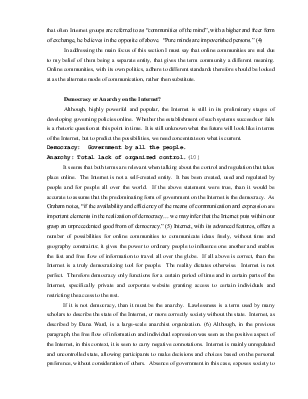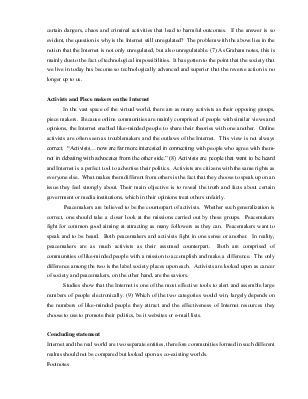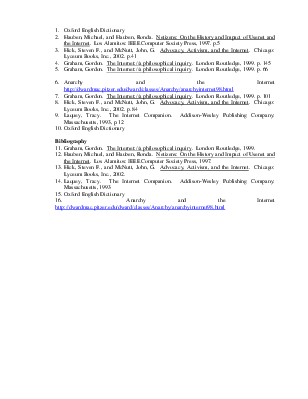



Are online communities real or fake?*
Introduction
The following essay will present and examine the politics of the virtual communities. This next set of questions will be answered in the order they are presented.
· The nature of virtual communities? Are they real or fake?
· Does democracy or anarchy predominate the Internet?
· Activists and peacemakers on the Web.
To explore an ongoing debate whether the virtual communities are real or fake, one should make a clear sense of what is the community in general.
Community: a body of people living in one district or having common interests or origins.(1)
The above term clearly applies to the physical world. The concern that has been raised today is whether it is possible to apply the alternated version of this term to the virtual world
One of the key differences between the online communities and the real-world communities, outlined by Hauben in his book titled Netizens, is the fact that society existing on the net welcomes intellectual activity. People exchange their ideas and opinions freely over the realms of the Internet. Hauben notes that the information is no longer a fixed commodity. “The Net is a grand intellectual and social commune in the spirit of the collective nature present at the origins of human society.” (2)
Having said that, the two worlds existing in two different realms, may simply be different in nature and politics. What seems to be overlooked by the Internet scholars is the fact that the virtual and the real-world communities must not be compared, but simply looked upon as co-existing along each other’s side. Due to the fact that technology is often blamed for the destruction of our sense of community, Internet is seen as the instrument for this erosion and is criticized by many. Hick and McNutt in their Web studies note that people should not loose the sight of their goals because of the technology. “The technology is only a tool- a means one may hope to further the ends, but not the be-all and end-all of the group or of an activity.”(3)
Graham, in his Internet-philosophical enquiry, notes that the old Cartesian idea states that persons are essentially minds and their bodies mere appurtenances. Although, Graham suggests that often Internet groups are referred to as “communities of the mind”, with a higher and freer form of exchange, he believes in the opposite of above. “Pure minds are impoverished persons.” (4)
In addressing the main focus of this section I must say that online communities are real due to my belief of them being a separate entity, that gives the term community a different meaning. Online communities, with its own politics, adhere to different standards therefore should be looked at as the alternate mode of communication, rather then substitute.
Although, highly powerful and popular, the Internet is still in its preliminary stages of developing governing policies online. Whether the establishment of such systems succeeds or fails is a rhetoric question at this point in time. It is still unknown what the future will look like in terms of the Internet, but to predict the possibilities, we need concentrate on what is current.
Democracy: Government by all the people.
Anarchy: Total lack of organized control.(10)
It seems that both terms are relevant when talking about the control and regulation that takes place online. The Internet is not a self-created entity. It has been created, used and regulated by people and for people all over the world. If the above statement were true, than it would be accurate to assume that the predominating form of government on the Internet is the democracy. As Graham notes, “if the availability and efficiency of the means of communication and expression are important elements in the realization of democracy… we may infer that the Internet puts within our grasp an unprecedented good from of democracy.” (5) Internet, with its advanced features, offers a number of possibilities for online communities to communicate ideas freely, without time and geography constraints; it gives the power to ordinary people to influence one another and enables the fast and free flow of information to travel all over the globe. If all above is correct, than the Internet is a truly democratizing tool for people. The reality dictates otherwise. Internet is not perfect. Therefore democracy only functions for a certain period of time and in certain parts of the Internet, specifically private and corporate website granting access to certain individuals and restricting the access to the rest.
Уважаемый посетитель!
Чтобы распечатать файл, скачайте его (в формате Word).
Ссылка на скачивание - внизу страницы.